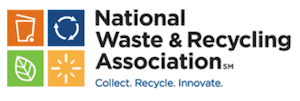NWRA Releases Study on Expected Outcomes of EPR Programs
Arlington, VA – The National Waste & Recycling Association (NWRA) and Eunomia Research & Consulting, an international sustainability consultancy, have released a study of established extended producer responsibility (EPR) programs. The study aims to help educate decision-makers on the efficacy of certain EPR policies.
Challenges with recycling have resulted in increased efforts to pass legislation at both the federal and state level advocating for EPR. While well-intentioned, many of these bills fail to address the root of the problems and also overlook existing recycling programs and their achievements.
“We were glad to partner with Eunomia to identify which EPR policies are most effective at achieving expected goals,” said NWRA President and CEO Darrell Smith. “We hope that this report will drive smart policymaking decisions that increase demand for recycled material.”
The study looked at four expected outcomes of EPR programs based on existing programs in Germany, Italy and France, including increases in recycling rates, increases in recycled content usage, increases in design-for-recycling practices and increases in the market value of collected packaging waste.
“It is great to see NWRA providing a strong voice on EPR policy as a resource for its members and to inform the wider recycling system in the U.S.,” said Sarah Edwards, head of Eunomia Americas. “We are pleased to provide our knowledge and experience of decades of EPR in Europe to inform the conversation in North America. We hope that this conversation can lead to more thoughtful and effective policy that includes targets and design-for-recycling to create the most effective and efficient recycling system possible.”
NWRA prefers efforts focused on increasing demand for recyclable materials to allow market forces to incentivize recycling. Increased use of post-consumer content is an essential component to increased demand. In circumstances where these efforts are not sufficient to increase demand, EPR may be considered.
###
ABOUT NWRA
The National Waste & Recycling Association (NWRA) represents the private sector waste and recycling services industry. Association members conduct business in all 50 states and include companies that manage waste, recycling and medical waste, equipment manufacturers and distributors, and a variety of other service providers. For more information about NWRA, please visit www.wasterecycling.org.
Contact
Brandon Wright
National Waste and Recycling Association
bwright@wasterecycling.org
202-364-3706

